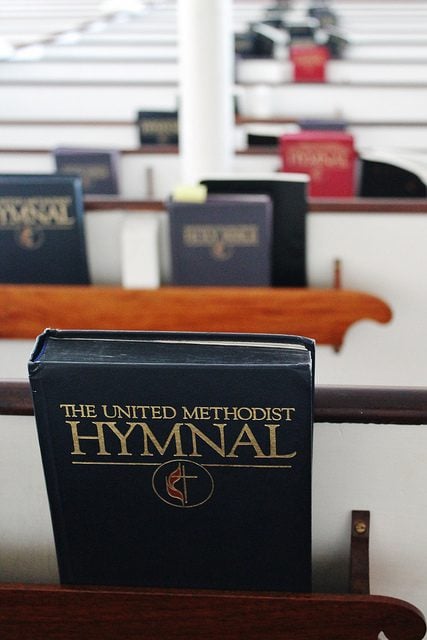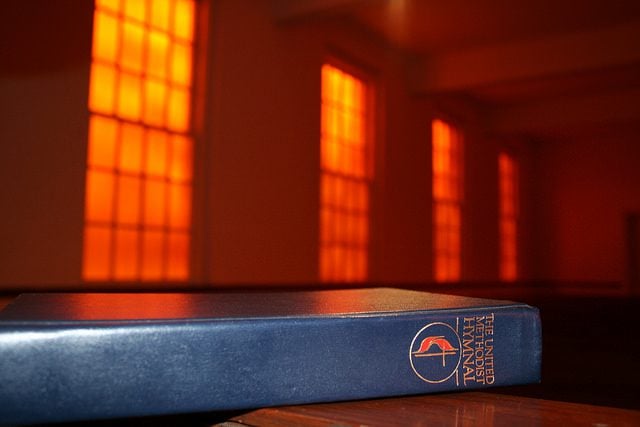A committee working on behalf of the Discipleship Ministries of the United Methodist Church has released a list, vetting the CCLI top 100 for theology and singability. Having married a United Methodist, and having served a United Methodist congregation for a number of years, this project was of interest to me. In the end, they have commended, some freely and some with reservation, approximately half the songs of the top 100 list. See their list and explanation here.
From the introduction:
The corpus of hymns and worship songs keeps expanding. We hope our work to generate these lists and the fuller detail that will appear on our website will be a useful toolset that helps you, our pastors, musicians and worship planners and leaders, discover and evaluate and help your congregations sing old and new songs that are both true to our United Methodist commitments and most appropriate for your particular contexts.
Because of the largely “contemporary” emphasis of the denomination in my area, I expected to largely reject the findings. In the end, I was pleasantly surprised at both the results and the care in their methodology. While I don’t agree with them at every point, and would personally trim the list even further, I think this is an important and frankly overdue step for the denomination.
Here are a few things I believe this team did particularly well.
Attention to theology, especially trinitarian language. Christian worship is fundamentally a trinitarian exercise, and that emphasis is vital to preserve a concrete and understanding of God’s character and work throughout human history. It keeps us honestly balanced in our approach, when we often would rather worship the God we want instead of the one true God. Contemporary songwriters have too often allowed themselves to be clumsy in their word choices, particularly with unclear and seemingly interchangeable use of divine titles.
I also appreciate the comments about the 20th-century gospel hymn “Victory in Jesus,” which, despite its catchy tune, puts forth a quite confusing and thoroughly unbiblical eschatology.
It’s not good enough that a song has happy words about Jesus. It’s not enough that there is no plain and obvious error to the music director or worship leader. We’ve got to be willing to give up our favorites when they don’t jive with what we, and more importantly, our denomination or faith tradition, believes about core theological doctrines.
Vetting by a qualified team. It’s not enough for a well-meaning but theologically untrained musician to pick songs that he or she likes. Theological vetting of the texts we proclaim in worship is imperative, and is a job that should be shared by theologians, biblical scholars, hymnal committees, church musicians, and seminary-trained pastors. That’s the kind of team at work here.
Attention to the sources of these songs. As the article points on, albeit in one paragraph, most of the CCLI songs (excepting the neo-Calvinist influence) come from a charismatic or Pentecostal tradition. While I have known and appreciate many great people from these traditions, there are reasons I’m not charismatic, and why I don’t worship like a charismatic. This is essential for us to consider when we choose songs, particularly new and untested ones, for use in worship. Blind use of texts originating outside our faith tradition, whether out of laziness or a misplaced, juvenile eclecticism (As in the angsty question, “Why can’t we all just be Christian?!?”)
There are a few implications I see in their choices that I believe need further examination and discussion.
The problem of the performance genre. Most of the songs the committee approved are not written for congregational singing, and as a result are quite difficult for a church to sing well. Listen to a few YouTube clips of these, and you’ll hear excessive syncopation, common ad-libbing from the “worship leaders” (performers? soloists?), and jumping octaves to avoid issues of range and tessitura. There are generally no standard notations of these songs, rendering them difficult for a congregation to follow. Most obviously, they are written for performance, and unless careful choices are made in regard to vocal and instrumental leadership, the congregation’s voice will be secondary to what’s happening on the platform (stage?).
Of course, a few of these songs are more traditional, vocally-driven, congregational hymns that are still under copyright (“How Great Thou Art,” “Great Is Thy Faithfulness”). “Before the Throne of God Above” is an older hymn text paired with a newer melody by Vikki Cook, which easily translates to a congregational-friendly style (It’s fantastic with organ accompaniment!).
The problem of the commercial worship industry. This market is driven by mass appeal, not musical or theological quality. Plainly put, the top priority of the worship industry is, of course, to sell stuff to as many people as possible, which, of course, creates plenty of problems. See this post for more on the trouble with the worship industry.
The problem of the small number of songs. 100 songs is simply not enough to choose from, and they have pared the list down even further. We need the witness of previous generations in our corporate worship for many reasons, not the least of which is because there are simply not enough good choices. Whichever of these songs we deem appropriate, whether one or fifty or a hundred, I would argue that these they shouldn’t be used exclusively, but should be added to the centuries-worth of great hymns, which have already been vetted time and time again, along with new contributions to the hymn tradition. Perhaps the team agrees, but I would have liked for it to be stated explicitly.
These critiques aside, this is the kind of work that needs to be done regularly in every denomination or faith tradition, so that we’re not so blinded by the new, the cool, and the current that we forget how much theology matters.
Photos:
Flickr, Charles Clegg, creative commons 2.0
Flickr, Glendale United Methodist, creative commons 2.0
Stay in touch! Like Ponder Anew on Facebook:



















